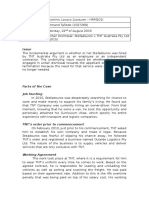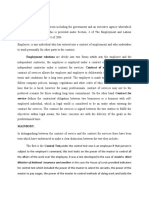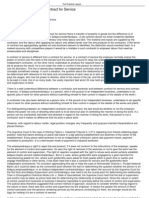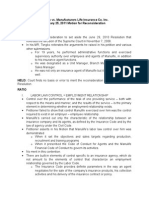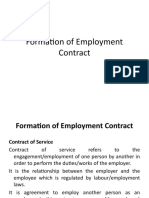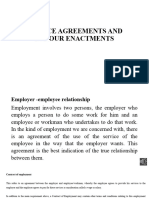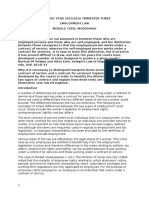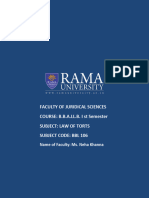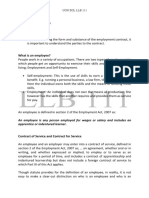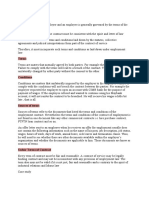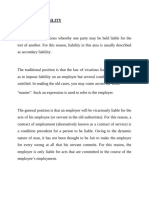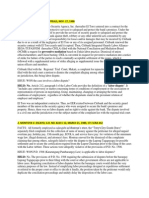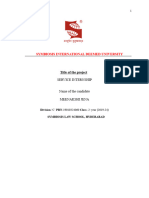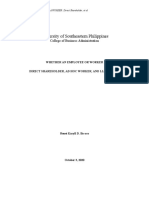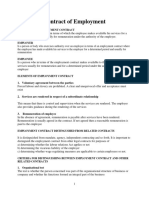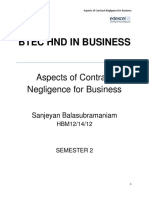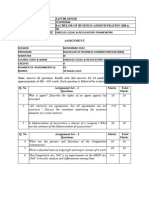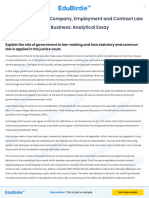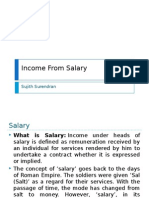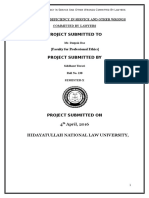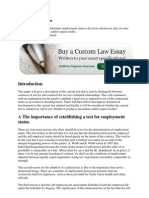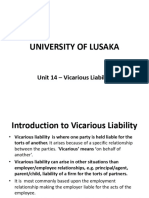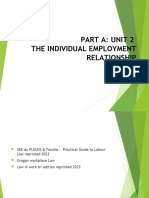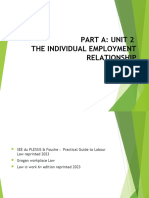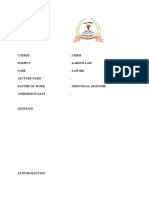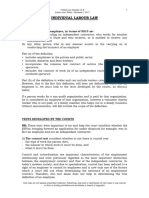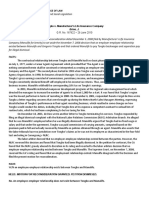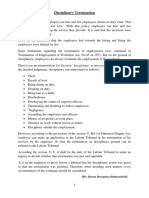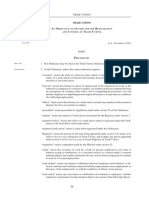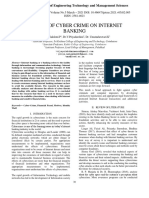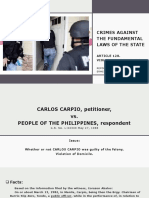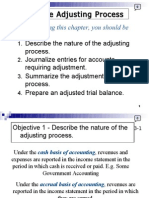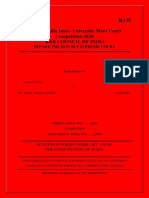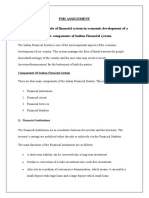SH INDUSTRIAL 1 2023.02.03 Contract of Service vs. Contract For Service ENG
SH INDUSTRIAL 1 2023.02.03 Contract of Service vs. Contract For Service ENG
Uploaded by
the advantis lkCopyright:
Available Formats
SH INDUSTRIAL 1 2023.02.03 Contract of Service vs. Contract For Service ENG
SH INDUSTRIAL 1 2023.02.03 Contract of Service vs. Contract For Service ENG
Uploaded by
the advantis lkOriginal Title
Copyright
Available Formats
Share this document
Did you find this document useful?
Is this content inappropriate?
Copyright:
Available Formats
SH INDUSTRIAL 1 2023.02.03 Contract of Service vs. Contract For Service ENG
SH INDUSTRIAL 1 2023.02.03 Contract of Service vs. Contract For Service ENG
Uploaded by
the advantis lkCopyright:
Available Formats
Contract of Service V.
Contract for Service
In contract for service, the servant himself becomes the master. Contracts for service
are made to exchange the knowledge and works for money. In here, a person agrees to
do a service and takes money after that service is provided by him. This is the contract
for service. Therefore the worker in a contract for service can be identified as an
independent contractor.
As contract for service comes under commercial contracts, remedies for the general
contract of law are applied when it is breached. Remedies under labour law do not
apply for a contract for service.
It has become very difficult to understand the difference between contract of service
and contract for service with the complexity of the industrial world. There is a little
difference between those two contracts. To understand that difference, it is required to
understand the nature of the contract that the two parties have entered.
Therefore it is very much important to distinguish those two types of contracts in
labour law. For that purpose, tests to identify a contract of service have been
introduced by courts through judgments. Such as,
01. Nominal Test
02. Control Test
03. Integration Test
04. Economic Reality Test
05. Multiple Test
Now we will discuss those tests briefly as follows,
1. Nominal Test
In the very beginning, the courts simply identified the nature a contract as specified in
the contract. On the face of the contract the court decided if it was a contract of
service or contract for service. But as the industrial society became complex, it
became very difficult to identify the nature of the contract with the expression on the
face of the contract.
[By- Sheran Dewapriya Hettiarachchi]
Young and Woods Ltd v. West
It was held that the true nature of the relationship that the parties entered into cannot
be identified by a mere label. And the relationship that the parties have can be altered
lately.
Ready Mixed Concrete Ltd v. Minister of Pensions and National Insurance
It was held that the relationship between the parties is a legal opinion which can be
decided on the facts.
De Silva v. The Associated Newspapers of Ceylon Ltd
It was held that the court was not bound by the introduction or nominal of the contract
and the true nature between the employer and the employee can be different than the
names that the parties had given in the contract.
2. Control Test
Here, it is considered the manner in which the master controls his servant. Whether
that person is his servant or not can be decided by the manner in which he controls
and commands on that person.
In this test the court considers different facts in order to decide the nature of the two
parties such as the ability of the master to select the servant, assign works to him,
decides his salary and work time and the power to terminate him etc.
If the master has the above power over the servant, such contract can be identified as
contract of service. If the master has less power over the servant that contract is a
contract for service.
Short v. Handerson
The court set out four elements in identifying contract of service as follows,
i. The master has the power in selecting his servant.
ii. The master has the power in determining the wages and other
remuneration of the servant.
iii. The master has the power to control the method on how the work is done.
iv. The master has right and power to suspend or dismiss the service provided
by his worker.
[By- Sheran Dewapriya Hettiarachchi]
Ceylinco Insurance Co. Ltd v. Commissioner of Labour
An insurance agent was contracted with the company for period of two years. Within
that period he shall not engage himself directly or indirectly in any occupation, work
or business with any other company or individual. The court used control test and held
that he was an employee of the company.
Sri Lanka Insurance Corporation Ltd v. Commissioner of Labour
He was a motor car assessor. His duties were inspections, assessment, investigations
etc and had to be available at short notice. He was not permitted to delegate his works.
It was held that he was an employee of the company.
Jamis Appuhamy v. Shanmugam
Justice Sharvananda held that the control test was very much important when deciding
the true nature of the parties.
However, the master’s power over the servant was gradually faded away due to the
modern technology and the knowledge and skills of the workers.
3. Integration Test
It is considered the integration of the worker to the company and how much his
service is important to the company.
If a worker is employed as part of the business and his work is done as an integral part
of the business, the contract between then is considered as contract of service.
Under a contract for service his work is, although done for the business, is not
integrated into it. He is considered as an independent contractor.
[By- Sheran Dewapriya Hettiarachchi]
Stevenson, Jordan and Harrison v. Mcdonald and Evans
The court established the integration test in this case. The question is whether or not
the work of an individual is an integral part of the business of the employer. Under a
contract for service a worker is not an integral part of the business but an accessary to
it.
This case was referred in Sri Lankan cases of De Silva v. Associated News Papers of
Ceylon and Perera v. Marikar Bawa Ltd
Perera v. Marikar Bawa Ltd
The appellant was the head Cutter of the company. He was provided with a cubicle
but employed his own workmen and using his own tools. The company passed
tailoring orders to him and he was paid commission. He did not sign the attendance
register and was not entitled to a bonus like other employees. It was held that his work
was an integral part of the business and therefore he was a workman under a contract
of service with the company.
4. Economic Reality Test
Market Investigation Ltd v. Minister of Social Security
Justice Cooke held that in order to distinguish between a contract of service and
contract for service, those two questions shall be asked from the person who provided
the service. Those two questions are,
i. Whether the worker is in business on his own account?
If the answer for this question is ‘yes’, he is not a workman but an
independent contractor.
If the answer for that question is ‘no’, he is, according to this test, a
workman.
ii. Whether the worker takes the ultimate risks of loss or chance of profit?
If the worker takes the risk of loss or chance of profit he is working under a
contract for service. So that he is an independent contractor.
[By- Sheran Dewapriya Hettiarachchi]
5. Multiple Test
Montreal v. Montreal Locomotive Works
Lord Wright was introduced multiple test in this case. According to him in many cases
question only be settled by examine the various elements of the relationship between
parties.
Due to the complexity of the industrial society, those tests cannot be used individually
to decide the nature of the contract between parties. It is proper to take all the tests
together and use in order to decide the true nature of the relationship of the parties.
In this test, the followings can be used to identify the nature of the relationship.
Control
Chance of profit
Use of tools and equipment
Risk of loss
By- Sheran Dewapriya Hettiarachchi
Attorney-at-Law,
BA (Sp) Hons(Sociology) J’pura
MA(Political)-Kelaniya
MA (ug)- Colombo
You might also like
- IRACDocument6 pagesIRACKhimiana Salazar100% (1)
- PUP CL RECAP Application FormDocument5 pagesPUP CL RECAP Application Formmrrrkkk100% (1)
- Employment Law EssayDocument5 pagesEmployment Law EssayLaurance NamukambaNo ratings yet
- Success In the Payroll Management Business: How to Start Your Own Payroll Management BusinessFrom EverandSuccess In the Payroll Management Business: How to Start Your Own Payroll Management BusinessRating: 2.5 out of 5 stars2.5/5 (2)
- Bud Hibbs Americas CreditDocument245 pagesBud Hibbs Americas CreditPete Kob0% (1)
- Contract of Services and Contract For Services Guidance NotesDocument6 pagesContract of Services and Contract For Services Guidance NotesKamugisha JshNo ratings yet
- labour lawDocument27 pageslabour lawnipuishaniNo ratings yet
- Labour LawDocument5 pagesLabour Lawkelvin kanondoNo ratings yet
- Employment Law Lecture Notes: Contract of ServiceDocument27 pagesEmployment Law Lecture Notes: Contract of ServiceAqilahNasrinNo ratings yet
- Contract of Service Vs Contract For ServiceDocument3 pagesContract of Service Vs Contract For Serviceanandprakash-1No ratings yet
- Tongko Vs Manulife January 25 2011 MRDocument7 pagesTongko Vs Manulife January 25 2011 MRElwell MarianoNo ratings yet
- TOPIC3Document17 pagesTOPIC3Conradus KakokoNo ratings yet
- Labour Law Course Work Group TwoDocument6 pagesLabour Law Course Work Group TwoUncle BrianNo ratings yet
- Week 10 - SERVICE AGREEMENTS AND LABOUR ENACTMENTSDocument19 pagesWeek 10 - SERVICE AGREEMENTS AND LABOUR ENACTMENTSVithus VithuNo ratings yet
- Employment Law Case Study EssayDocument10 pagesEmployment Law Case Study EssayHarry LimniotisNo ratings yet
- Lecture 20Document17 pagesLecture 20kirankaurchahal.kkNo ratings yet
- Employer - Employee Status and Types of Work RelationshipsDocument16 pagesEmployer - Employee Status and Types of Work RelationshipsCarolineNo ratings yet
- ERMP Synopsis Collated - Theme 1,2,3,4,5Document77 pagesERMP Synopsis Collated - Theme 1,2,3,4,5Kaveri PriyambadaNo ratings yet
- Contract of EmploymentDocument9 pagesContract of EmploymentJESSIE THOONo ratings yet
- TUTORIAL 1 Contract of ServiceDocument4 pagesTUTORIAL 1 Contract of ServiceShalini NishaNo ratings yet
- Uol - Vicarious LiabilityDocument29 pagesUol - Vicarious LiabilityjohnsoncomplexghltdNo ratings yet
- LEC 8-Law of Employment + Agency (29.08.2020)Document46 pagesLEC 8-Law of Employment + Agency (29.08.2020)Ruvini FernandoNo ratings yet
- Case Digest - Labor RelationDocument4 pagesCase Digest - Labor RelationJanine Prelle DacanayNo ratings yet
- Service Internship Minakshi - MEENAKSHI - JenaDocument10 pagesService Internship Minakshi - MEENAKSHI - JenasanNo ratings yet
- Case Study - Whether An Employee or WorkerDocument11 pagesCase Study - Whether An Employee or WorkerRenei Karyll BaacoNo ratings yet
- Contract of Service Contract of Service: Labour Law (Multimedia University) Labour Law (Multimedia University)Document5 pagesContract of Service Contract of Service: Labour Law (Multimedia University) Labour Law (Multimedia University)TaySoonYehNo ratings yet
- LABOR Case DigestDocument14 pagesLABOR Case DigestKim CuarteroNo ratings yet
- Contract of Employment & Types of OrganisationsDocument22 pagesContract of Employment & Types of OrganisationsShepherd NhangaNo ratings yet
- Contract of Employment & Types of OrganisationsDocument16 pagesContract of Employment & Types of OrganisationsKomborero MagurwaNo ratings yet
- Vicarious LiabilityDocument24 pagesVicarious Liabilitymanasa_s_raman83% (6)
- Boo Yoon Lian Case.Document19 pagesBoo Yoon Lian Case.muhd fadhil mohd sallehNo ratings yet
- Acnb 1Document13 pagesAcnb 1Hijaz AhamedNo ratings yet
- Employment LawDocument7 pagesEmployment LawLisa NNo ratings yet
- LABOR LAW II NotesDocument4 pagesLABOR LAW II NoteshessarhouNo ratings yet
- Employment LawDocument32 pagesEmployment LawniklynNo ratings yet
- SH INDUSTRIAL 3 2023.02.03 Casual Employment ENGDocument2 pagesSH INDUSTRIAL 3 2023.02.03 Casual Employment ENGthe advantis lkNo ratings yet
- Assignment - DBB2101 - BBA 3 - Set 1 and 2 - Nov 23Document7 pagesAssignment - DBB2101 - BBA 3 - Set 1 and 2 - Nov 23Finproject IndiaNo ratings yet
- Potential Impact of Company, Employment and Contract Law On A Business AnalyticDocument4 pagesPotential Impact of Company, Employment and Contract Law On A Business AnalyticelizabethcronenburgNo ratings yet
- Additional CasesDocument8 pagesAdditional CasesKatrina Vianca DecapiaNo ratings yet
- Income From SalaryDocument65 pagesIncome From SalarySujith100% (1)
- Lord Chelmsford LC Said: Every: (1853) 3 Macq 300Document24 pagesLord Chelmsford LC Said: Every: (1853) 3 Macq 300Shivansh PamnaniNo ratings yet
- (Faculty For Professional Ethics) : Iability FOR Deficiency IN Service AND Other Wrongs Committed BY LawyersDocument23 pages(Faculty For Professional Ethics) : Iability FOR Deficiency IN Service AND Other Wrongs Committed BY LawyersMalay PathakNo ratings yet
- Employer and Employee RelationshipDocument6 pagesEmployer and Employee RelationshipJESSIE THOONo ratings yet
- 2.10. Tongko vs. Manufacturer Life Insurance Co. (Phils), Inc., Et Al., G.R. No. 167622, January 25, 2011Document4 pages2.10. Tongko vs. Manufacturer Life Insurance Co. (Phils), Inc., Et Al., G.R. No. 167622, January 25, 2011Aid BolanioNo ratings yet
- Admin Law 3Document14 pagesAdmin Law 3Meshandren NaidooNo ratings yet
- Trade Union CasesDocument11 pagesTrade Union CasesSupriya BorseNo ratings yet
- Conflict of Interest Vs Duty of Fidelity and Good FaithDocument24 pagesConflict of Interest Vs Duty of Fidelity and Good FaithAfaf NailyNo ratings yet
- Employment LawDocument7 pagesEmployment LawNg Yih MiinNo ratings yet
- Professional Ethics - End Term Paper 1Document11 pagesProfessional Ethics - End Term Paper 1ManishaNo ratings yet
- Tort Unit 14Document31 pagesTort Unit 14zeevaariahserenityNo ratings yet
- Individual Employment Relationship L2Document36 pagesIndividual Employment Relationship L2sisekosilinga21No ratings yet
- Individual Employment Relationship L2Document29 pagesIndividual Employment Relationship L2sisekosilinga21No ratings yet
- Labour GroupDocument6 pagesLabour Groupkelvin kanondoNo ratings yet
- By Ms. Pradnya Devrao Kamble Roll No. 102 Sy-Llb Under The Guidance of Prof. Sanjay SinghDocument18 pagesBy Ms. Pradnya Devrao Kamble Roll No. 102 Sy-Llb Under The Guidance of Prof. Sanjay SinghPradnya KambleNo ratings yet
- Employment Law Notes Sources of Employment Law in TanzaniaDocument29 pagesEmployment Law Notes Sources of Employment Law in TanzaniaThomas MalitiNo ratings yet
- Lecture Three A-Comprehend Legal Aspects of Industrial ActDocument22 pagesLecture Three A-Comprehend Legal Aspects of Industrial ActLeopord LeonNo ratings yet
- Labor Law Review (Midterm)Document28 pagesLabor Law Review (Midterm)Jauhari C. AzisNo ratings yet
- Labor Digested Cases (2017)Document129 pagesLabor Digested Cases (2017)Kim Ecarma50% (2)
- An Indian Perspective On Employment AgreementsDocument11 pagesAn Indian Perspective On Employment AgreementskaranNo ratings yet
- Labour Notes Final 2017Document131 pagesLabour Notes Final 2017tsibeko638No ratings yet
- Fixed-Term Employment ContractDocument6 pagesFixed-Term Employment ContractJazztine ArtizuelaNo ratings yet
- Tongko V Manufacturer's Life Insurance CompanyDocument4 pagesTongko V Manufacturer's Life Insurance CompanymiguelnacpilNo ratings yet
- SH INDUSTRIAL 1 2023.02.03 1 Types of Employment SIN 1Document10 pagesSH INDUSTRIAL 1 2023.02.03 1 Types of Employment SIN 1the advantis lkNo ratings yet
- SH INDUSTRIAL 2 2023.02.03 Probation Employment ENGDocument3 pagesSH INDUSTRIAL 2 2023.02.03 Probation Employment ENGthe advantis lkNo ratings yet
- SH INDUSTRIAL 3 2023.02.03 Casual Employment ENGDocument2 pagesSH INDUSTRIAL 3 2023.02.03 Casual Employment ENGthe advantis lkNo ratings yet
- SH INDUSTRIAL 5 2023.02.03 Disciplinary Termination ENGDocument2 pagesSH INDUSTRIAL 5 2023.02.03 Disciplinary Termination ENGthe advantis lkNo ratings yet
- SH INDUSTRIAL 6 2023.02.03 Workmen's Compensation Ordinance ENGDocument4 pagesSH INDUSTRIAL 6 2023.02.03 Workmen's Compensation Ordinance ENGthe advantis lkNo ratings yet
- SH INDUSTRIAL 4 2023.02.03 Termination of Employment of Workmen Act, 71 ENGDocument4 pagesSH INDUSTRIAL 4 2023.02.03 Termination of Employment of Workmen Act, 71 ENGthe advantis lkNo ratings yet
- SH INDUSTRIAL 8 2023.02.03 Strike ENGDocument3 pagesSH INDUSTRIAL 8 2023.02.03 Strike ENGthe advantis lkNo ratings yet
- SH INDUSTRIAL 7 2023.02.03 Trade Unions OrdinanceDocument18 pagesSH INDUSTRIAL 7 2023.02.03 Trade Unions Ordinancethe advantis lkNo ratings yet
- SH INDUSTRIAL 10 2023.02.03 Arbitration ENGDocument5 pagesSH INDUSTRIAL 10 2023.02.03 Arbitration ENGthe advantis lkNo ratings yet
- SH INDUSTRIAL 11 2023.02.03 Labour Tribunal ENGDocument4 pagesSH INDUSTRIAL 11 2023.02.03 Labour Tribunal ENGthe advantis lkNo ratings yet
- SH INDUSTRIAL 7 2023.02.03 Trade Union Law ENGDocument4 pagesSH INDUSTRIAL 7 2023.02.03 Trade Union Law ENGthe advantis lkNo ratings yet
- Leave Form - Royette Roll - 14july2021Document4 pagesLeave Form - Royette Roll - 14july2021lnicolas00No ratings yet
- List of Branches Visayas Balance TransferDocument4 pagesList of Branches Visayas Balance TransferMae Ann GonzalesNo ratings yet
- G.R. No. 170606 November 23, 2007 LCK Industries Inc., Chiko Lim and Elizabeth T. Lim, Petitioners, Planters Development Bank, RespondentDocument76 pagesG.R. No. 170606 November 23, 2007 LCK Industries Inc., Chiko Lim and Elizabeth T. Lim, Petitioners, Planters Development Bank, RespondentlazylawatudentNo ratings yet
- 129 - Biblical Counseling and Church DisciplineDocument3 pages129 - Biblical Counseling and Church Disciplinechris iyaNo ratings yet
- Has Devolution Worked Essay Collection FINALDocument180 pagesHas Devolution Worked Essay Collection FINALBdu MV100% (1)
- Ppt-Elder 2Document30 pagesPpt-Elder 2John MaduraNo ratings yet
- Superannuation TPD Claims Gerard Malouf PartnersDocument6 pagesSuperannuation TPD Claims Gerard Malouf PartnersUni TabberNo ratings yet
- Bill of Rights ScrapbookDocument8 pagesBill of Rights ScrapbooksambaNo ratings yet
- HazpakDocument20 pagesHazpakqhseconsultNo ratings yet
- (G.R. No. 521518. International Harwood V UPDocument13 pages(G.R. No. 521518. International Harwood V UPRogie ToriagaNo ratings yet
- Impacts of Cyber Crime On Internet BankingDocument5 pagesImpacts of Cyber Crime On Internet BankingSrivastavaNo ratings yet
- Laffer Curve: Key TakeawaysDocument2 pagesLaffer Curve: Key TakeawaysShashwat S RNo ratings yet
- Fifo Lifo 1Document13 pagesFifo Lifo 1Nandan Kumar JenaNo ratings yet
- (24513113 - International Conference KNOWLEDGE-BASED ORGANIZATION) Changes in The American Foreign Policy - From Obama To TrumpDocument6 pages(24513113 - International Conference KNOWLEDGE-BASED ORGANIZATION) Changes in The American Foreign Policy - From Obama To TrumpRaluca Estera CârdeiNo ratings yet
- Chapter 4 Answer KeyDocument1 pageChapter 4 Answer KeyStefanie SaphiraNo ratings yet
- Sarbananda SonowalDocument9 pagesSarbananda SonowalHumanyu KabeerNo ratings yet
- Violation of Domicile - Carpio vs. PeopleDocument9 pagesViolation of Domicile - Carpio vs. Peopleermeline tampus100% (1)
- CH 03Document29 pagesCH 03S M Saad SaleemNo ratings yet
- Reynolds HQ 21-24 Cross Referenced To DOC-EDA-2021-001286 Final LTR d5OjGhvDocument2 pagesReynolds HQ 21-24 Cross Referenced To DOC-EDA-2021-001286 Final LTR d5OjGhvSam ReynoldsNo ratings yet
- R135 (Round 1)Document15 pagesR135 (Round 1)Rajnish SinghNo ratings yet
- (FEU IL CBO) Political Law - Last Minute Tips 2023Document12 pages(FEU IL CBO) Political Law - Last Minute Tips 20231234qwertyu765gfbhvdNo ratings yet
- Demand Letter - Mattro Construction 27 October 2020Document2 pagesDemand Letter - Mattro Construction 27 October 2020Anne Lorraine DioknoNo ratings yet
- Electronic Ticket Receipt, April 29 For MR SHARABH SHARMADocument3 pagesElectronic Ticket Receipt, April 29 For MR SHARABH SHARMASurender SharmaNo ratings yet
- Full List of PESTEL FactorsDocument1 pageFull List of PESTEL FactorsColleen Guimbal100% (1)
- Fmi Assignment 2Document15 pagesFmi Assignment 2Jaishree MBA2021MBNo ratings yet
- Lesson 6.0 The Act of Proclamation of Independence of The Filipino PeopleDocument10 pagesLesson 6.0 The Act of Proclamation of Independence of The Filipino PeopleQuinnie CervantesNo ratings yet
- 207586-2017-Knights of Rizal v. DMCI Homes Inc PDFDocument135 pages207586-2017-Knights of Rizal v. DMCI Homes Inc PDFJeunice VillanuevaNo ratings yet
- UNITED STATES of America Ex Rel. Joseph KACHINSKI, Appellant, v. A. C. CAVELL, Superintendent, State Correctional Institution, at RockviewDocument6 pagesUNITED STATES of America Ex Rel. Joseph KACHINSKI, Appellant, v. A. C. CAVELL, Superintendent, State Correctional Institution, at RockviewScribd Government DocsNo ratings yet
